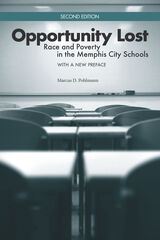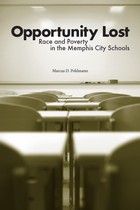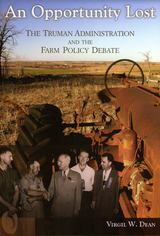
In Opportunity Lost, Marcus D. Pohlmann examines the troubling issue of why Memphis city school students are underperforming at alarming rates. His provocative interdisciplinary analysis, combining both history and social science, examines the events before and after desegregation, compares a city school to an affluent suburban school to pinpoint imbalances, and offers critical assessments of various educational reforms.
In addition to his analysis of the problems, Pohlmann lays out educational reforms that run the gamut from early intervention and parental involvement to increasing teacher compensation, improving time utilization, and more. Pohlmann’s illuminating and original study has wide application for a problem that bedevils inner-city children everywhere and prevents the promise of equality from reaching all of our nation’s citizens.

In Opportunity Lost, Marcus D. Pohlmann examines the troubling issue of why Memphis city school students are underperforming at alarming rates. His provocative interdisciplinary analysis, combining both history and social science, examines the events before and after desegregation, compares a city school to an affluent suburban school to pinpoint imbalances, and offers critical assessments of various educational reforms.
Employing a rich trove of data to demonstrate the realities of racial and economic inequality, Pohlmann underscores the difficulties that plague the urban schools and their students-problems that persist despite the fact that the city schools often have more resource advantages than the county schools: better student-to-teacher ratios, more teachers with advanced degrees, and even greater spending on each student. Pohlmann demonstrates that post-industrial economic shifts and continuing racial exclusion have resulted in a predominance of low-income students at these schools. This economic disadvantage has had a lasting impact on performance among students at all grade levels and has not been reversed simply by increasing resources.
In addition to his analysis of the problems, Pohlmann lays out educational reforms that run the gamut from early intervention and parental involvement to increasing class size and teacher compensation, improving time utilization, and more. Pohlmann's illuminating and original study has wide application for a problem that bedevils inner-city children everywhere and prevents the promise of equality from reaching all of our nation's citizens.
Marcus D. Pohlmann is professor of political science at Rhodes College. He is the author of Governing the Postindustrial City; coauthor, with Michael P. Kirby, of Racial Politics at the Crossroads: Memphis Elects W. W. Herenton; and editor of the six-volume African American Political Thought.

READERS
Browse our collection.
PUBLISHERS
See BiblioVault's publisher services.
STUDENT SERVICES
Files for college accessibility offices.
UChicago Accessibility Resources
home | accessibility | search | about | contact us
BiblioVault ® 2001 - 2024
The University of Chicago Press









